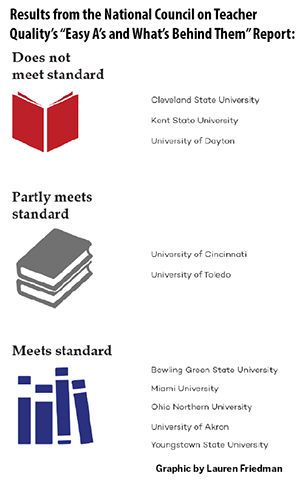Education curriculum deemed not challenging, NCTQ report says

Graphic by Lauren Friedman
November 23, 2014
The National Council on Teacher Quality released a report titled “Easy A’s and What’s Behind Them” that deemed Kent State’s education curriculum not rigorous enough.
However, officials at Kent State do not believe the November report shows an accurate representation of the curriculum.
“I think that study is fundamentally flawed,” said Todd Diacon, provost and senior vice president for Academic Affairs. “I think it’s so flawed as to be silly.”
The NCTQ collected data for this report by gathering commencement brochures and comparing the number of education majors who graduated with honors to the total number of students who graduated with honors, according to a representative from the NCTQ.
“They based the conclusion on whether our program was rigorous or not by looking at how many of our students graduated with honors versus the rest of the university,” said Daniel Mahony, dean of the College of Education, Health and Human Services. “The problem with that is they assume the only way they could have graduated with honors is if our classes weren’t rigorous and if there was grade inflation in education classes.”
The NCTQ received the commencement brochures by finding them online, reaching out to different schools and individual students and by sending open records requests.
They also look at course syllabi by collecting a random sample of syllabi on file from various universities. They did not look at Kent State’s syllabi this year.
A representative from the NCTQ said that looking at how many students had graduated with honors was the best way to judge the coursework, and that they hope to be able to rate based on the rigor of the coursework itself in the future.
The average GPA of students coming into the College of Education, Health and Human Services with 60 credit hours is a 3.4, and the average GPA of graduating students is a 3.5, Mahony said.
Students must have a certain GPA to get into the program as a junior, so it’s a function of the academic profile of the students that are taking those majors, Diacon said.
“I think it would be very different if our students were graduating with honors at a higher rate, and they were getting Cs in other classes, then that would be an indication that perhaps there is a lack of rigor, but again, when an A-B student gets As and Bs, that’s what we would expect them to do,” Mahony said. “I think they would really have to look much more closely at who is coming into the program and not assume that they are weaker students to start with, which they did.”
The NCTQ has also been criticized by Eduventures, an organization that provides research data to universities like Kent State, for not being legitimate.
“NCTQ is a social change organization, not a research organization,” Eduventures said in “The National Council on Teacher Quality Organizational Aims and Assessment Methods” report published in spring 2013.
In the same report, Eduventures also said the NCTQ intentionally tries to close some teaching programs.
Eduventures said in a spring 2013 anaylsis that success for the National Review of Teacher Preparation means teacher training programs conform to NCTQ’s standards of quality or they are forced out of business.
“It doesn’t go into the depth that you would really want to look into if a program is rigorous or not,” Mahony said. “We look at all of those things ourselves.”
Contact Hanna Moore at [email protected].
























